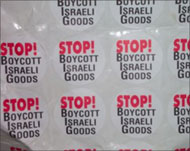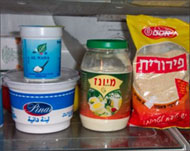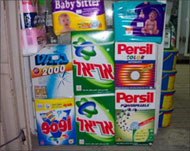‘Boycott Israel’ calls gather steam
Stroll down Gaza’s busy streets and you will undoubtedly run into one of the many small convenience stores crowding the cramped sidewalks.

They tempt consumers with a kaleidoscopic display of goods, ranging from bags of crisps and bottles of soft drinks, to nappies and laundry detergents.
But a close look will reveal the majority of the goods being sold are usually Israeli in origin.
And as the Intifada continues, many Palestinians are questioning their dependence on Israeli goods.
Is it a matter of convenience, necessity, or both? Why do stores continue to sell such items, and why do consumers continue to buy them given that Palestinian alternatives now exist?
Several Palestinian civil society organisations have been asking these same questions, and a boycott campaign is gathering steam.
According to Majid Maali, director-general of the Palestinian Businessmen’s Association, arranging and maintaining a boycott is not as easy as it sounds.
“If you are asking for the closing of the Palestinian market to the Israeli market and the Israeli market to Palestinian goods, it’s a contradiction of sorts – we will only be hurting ourselves,” he said.
“It’s a matter of public awareness, but as a policy you can’t ask to close the Palestinian market to Israeli or foreign goods.”
Settlement boycott
“Unlike Israeli goods, Palestinian and other goods pass through three different border crossings. Israel stalls the goods and many, like dairy products, go bad in the process” Khamis Ilaywa |
But what does have the potential to succeed, he added, is a strategic boycott of products manufactured in Israeli settlements.
There are nearly half a million Jewish settlers in East Jerusalem, the West Bank and Gaza Strip, even though all Israeli settlements are illegal under international law.
The Palestinian territories are the second biggest market for the settlements, and the challenges for a potential boycott are many.
Al-Marsad al-Filistini, or the Palestinian Observatory, is a consortium of Palestinian NGOs who support the boycott effort against Israeli settlements.
It says settlement products such as vegetables, fruits and flowers are usually mixed in with other Israeli products. As a result, most Palestinians cannot distinguish between the two even if they wanted to.
Storeowners are likewise faced with a dilemma.
While by their own admission, their number one priority is pleasing their customers and making a profit, their selection of goods is limited and subject to Israeli approval.
“Every customer has a different preference. Usually they think Israeli products are better because of the quality. But then part of the reason for this is that unlike Israeli goods, Palestinian and other goods pass through three different border crossings.
“Israel stalls the goods and many, like dairy products, go bad in the process,” said Gaza storeowner Khamis Ilaywa.
Public opinion
 |
|
A ‘Made in Palestine’ promotional |
But Palestinian consumers have also hampered boycott efforts.
While the overwhelming majority of Palestinians surveyed in a recent opinion poll by Gaza’s Consumer Protection Society supported some form of a boycott of Israeli goods, this is not often translated into action because of consumer fears about product quality.
“Honestly I’m scared to try Palestinian dairy products,” said Araksi Wahid, another consumer and long-time Gaza pharmacist.
“They aren’t guaranteed, and there is no oversight in the plants. With time, if there is awareness we can encourage Palestinian products. Right now they are just not up to par.”
And analysts say Israeli products have an unfair advantage because fledgling Palestinian industries are forced to compete with subsidised Israeli products.
“Consumers here prefer Israeli goods because they are better… but they’re better because they’ve had a chance to grow and become this good, because they were subsidised and because they’ve had a much easier operating environment,” said political analyst Muhammad Ghalayini.
Palestinian companies also face a multitude of problems in producing and marketing their products.
The United Nations Development Programme estimates that production capacity within all sectors of the Gaza Strip has dropped by about 50% since the start of the Intifada due to the inability to access raw materials.
“It’s becoming harder and harder for Palestinian businesses to survive,” said UNDP director Khalid Abd al-Shafi.
Paris Protocol
 |
|
Palestinian fridges are a mix of |
Boycott organisers say they also face institutionalised challenges to their efforts, citing the Paris Protocol – an economic agreement.
The protocol maintains that Palestinian trade is subject to Israeli approval, which makes for major economic losses in the case of a closure, according to the Israeli human rights group B’tselem.
The protocol also gives Israel sole control over external borders and collection of import taxes and VAT, thus enabling them to delay transfer of taxes collected for the Palestinian Authority.
While PA officials assert they were forced to sign the agreement as part of the Oslo Peace Accord, they likewise admit to their own culpability in abusing the agreement.
They have often intentionally taken advantage of local producers’ vulnerabilities and foreign Palestinian investors’ wealth.
Mahmud al-Ajrami, of the Ministry of Foreign Affairs, said: “Yes, it’s absolutely true – the PA encouraged Israeli investment over Palestinian investment.
“And actually it was worse than that – they would intentionally attempt to destroy the infrastructure of many Palestinian projects in the works in order to gain a commission on rebuilding it, or to tax it again.”
Discouraged
|
“We’re not asking for a full boycott, but what we do want is for the average consumer to at the very least support Palestinian products” Majid Maali,director-general, Palestinian Businessmen’s Association |
Hashim Husayni can attest to this policy.
His father’s cement factory was shut down last year when it simply became too difficult and too expensive to run.
According to the Palestinian law of investment, Husayni’s father was entitled to purchase a car tax-free, but the PA slapped on a customs tax anyway and took a commission on its sale.
The PA also opted to buy more expensive building materials from Israel, rather than supporting local factories like that of Husayni.
The factory, which has been damaged in recent fighting, now sits idle with Israeli tanks not far behind.
Husayni, an economic researcher, says incidents like these discourage the Palestinian industry.
But some investors, like Sam Bahour, a Palestinian-American who created the first ever multi-million dollar American-style Palestinian mall in Ram Allah late last year, remain persistent.
In the mall’s 2000 square metre “Bravo” supermarket, Bahour recently launched the “Made in Palestine” campaign.
The campaign promotes locally manufactured products by making deals with local suppliers and decorating each Palestinian product with an attractive “Made in Palestine” tag.
The supermarket also boycotts all Israeli settlement products as a matter of policy.
“Our strategy as a company is ‘no settlement products’. [Non-settlement] Israeli products are to be sold where there is a demand for them, but at the same time there is heavy promotion for ‘Made in Palestine’ products, price-wise and display-wise,” said Bahour.
Public awareness
 |
|
Palestinian alternatives are |
But in the end, the choice is up to the consumer and the consumer prefers Israeli products, he added.
“The perception is that local products are of less quality. There needs to be a lot of education.”
Bahour is teaming up with the Palestinian Observatory to advertise the importance of promoting local products on grocery bags and pamphlets, among other things.
Others involved in the boycott effort agree, citing public awareness as the number one goal of their campaign.
Saud Swairki, director of the Consumer Protection Society, says they are trying to allay Palestinian fears by putting pressure on Palestinian industries to do a better job.
“We achieve our goals through consumer awareness, and by raising confidence in Palestinian products,” said Swairki.
The society is also re-activating its boycott campaign, which will encompass settlement goods, complementary goods, and goods that have an alternative in the Palestinian industry, such as drinks or sweets.
|
“The Palestinian citizen has proven he is ready, and in the end of the day it is he [or she] who decides. It comes down to individual preference” Saud Swairki, |
Swairki says they will run a massive public awareness campaign during the summer, targeting schools and summer camps as well as community and youth centres.
“The Palestinian citizen has proven he is ready, and in the end of the day it is he [or she] who decides. It comes down to individual preference,” said Swayrki.
“We would like to tell Palestinian industries this is an historical opportunity to improve their quality and gain the trust of their consumers.
Majid Maali, of the Palestinian Businessmen’s Association, added: “We’re not asking for a full boycott, but what we do want is for the average consumer to at the very least support Palestinian products.
“On the other hand, you have to be fair to the consumer – you can’t ask him to blindly support poor quality goods. The onus is on Palestinian companies to increase the quality and comparative advantage of their goods.”